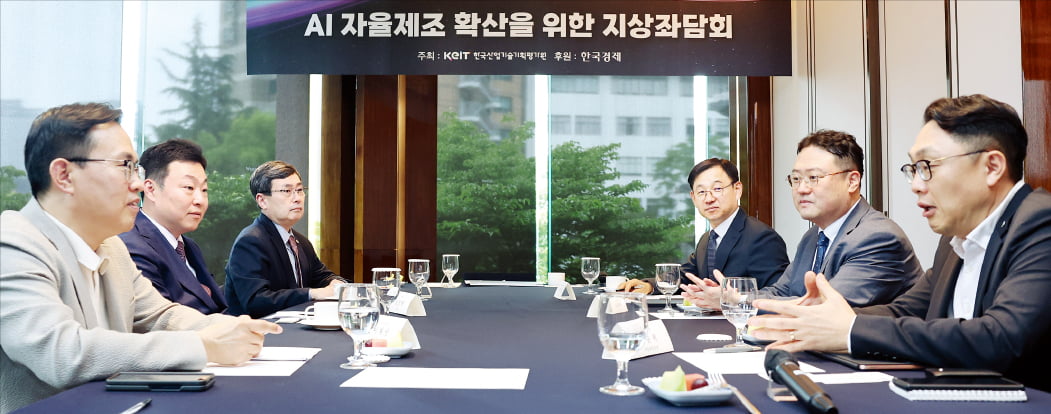
Participants in the 'Ground Roundtable for the Expansion of AI Autonomous Manufacturing' are sharing their opinions. Clockwise from the far left: Lee Jae-min, Director of Hyundai Motor Company's E-Forest Center, Oh Kyung-taek, CEO of Sungwon, Lee Sang-mok, President of the Korea Institute of Industrial Technology, Jeon Yoon-jong, President of the Korea Institute of Industrial Technology Planning and Evaluation, Jaesik Choi, Professor at KAIST, and Lee Jun-hyeok, Head of the Automation Division at HD Hyundai Samho.
“In order to win a war with China, the only way is to hasten the convergence of manufacturing and artificial intelligence (AI).” (Jeon Yun-jong, President of the Korea Institute of Industrial Technology Planning and Evaluation)
Domestic artificial intelligence (AI) experts have urged that Korea should hasten the convergence of manufacturing and AI in order to avoid handing over its high-tech industrial hegemony to China. This is because they judged that although China has surpassed Korea in some manufacturing industries, it still lags behind Korea in the AI sector specialized in manufacturing. Therefore, they emphasized that the current situation is Korea’s last chance to maintain its status as a manufacturing powerhouse.
◇“China is already on top of Korea”
Experts agreed that the Korean manufacturing industry should feel a sense of crisis at the symposium on expanding AI autonomous manufacturing, hosted by the Ministry of Trade, Industry and Energy and the Korea Institute of Technology Evaluation and Planning (KEIT) at the Westin Chosun Hotel in Sogong-dong, Seoul on
the 19th. In the discussion hosted by Lee Jeong-seon, a mid-level reporter at the Korea Economic Daily, Lee Jun-hyeok, head of the automation division at HD Hyundai Samho, pointed out that “the Chinese shipbuilding industry is at a stage where it is technologically surpassing that of Korea thanks to the Chinese government’s bold support for AI.” He continued, “In order to maintain the competitiveness of the domestic shipbuilding industry, physical AI should be introduced to the entire life cycle, including design and production, to strengthen work stability and create results such as cost reduction and improved productivity.”







